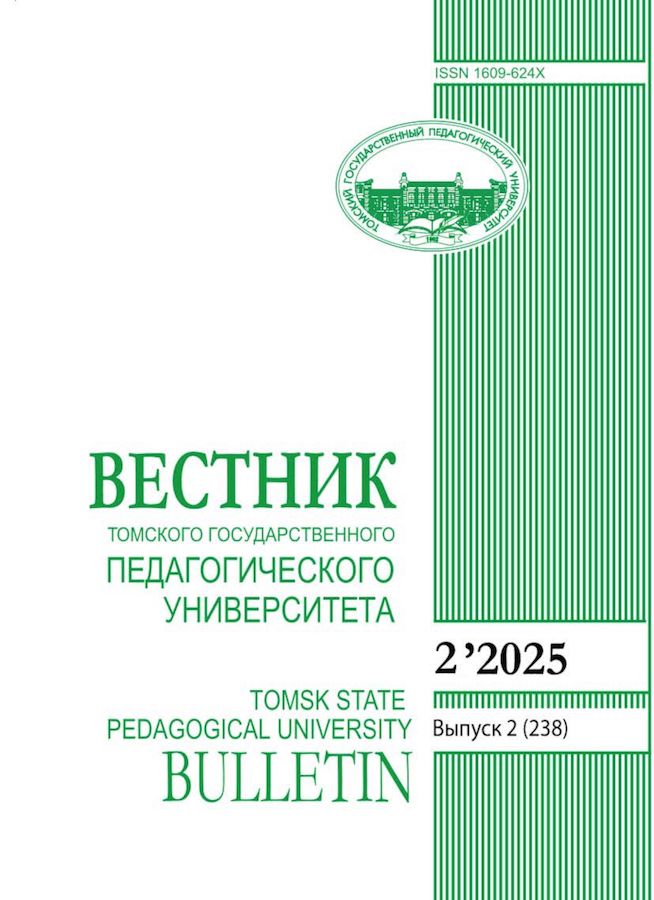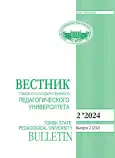No 2 (2024)
PROFESSIONAL TRAINING OF TEACHERS
Conventional-reflexive system of teaching methods for training a professionally mobile teacher in a digital educational environment
Abstract
 7-15
7-15


The target component of the methodological system for preparing the future teacher for individualized teaching of mathematics
Abstract
 16-24
16-24


The bachelor’s training curriculum formation according to the Higher Pedagogical Education Core requirements
Abstract
 25-33
25-33


Constructing developmental educational texts as a factor in the development of methodical thinking
Abstract
 34-43
34-43


EDUCATION ISSUES
Technology of formation of the value attitude of adolescents to health by means of pedagogical stimulation
Abstract
 44-53
44-53


Inclusive educational environment of the university as a necessary condition for successful socialization of students with disabilities
Abstract
 54-63
54-63


Information and analytical approach to the design of educational content in the system of scientific and methodological support for class teachers
Abstract
 64-72
64-72


DIDACTICS AND TEACHING METHODS
Geography program in a secondary school in Mongolia: history of development of methods for teaching geography
Abstract
 73-81
73-81


METHODOLOGY OF PEDAGOGY AND EDUCATION
Implementation of the University 4.0 in the Siberian Federal District
Abstract
 82-90
82-90


Structural-context approach in the pedagogical research
Abstract
 91-100
91-100


FOREIGN LANGUAGE TEACHING
Culture shock and the problem of linguocultural adaptation of students in a foreign-language environmen
Abstract
 101-109
101-109


Academic cheating online during COVID-19 (studying a foreign language as a case study)
Abstract
The online academic cheating (OAC) is widely discussed in academic circles of different countries. The present study was conducted after the second COVID-19 wave and therefore reflects the process of mass transition to online learning, which contributes to the originality of the research. The specificity of methodological approach is comparing the opinions of teachers and students, a total of 488 respondents answering online questionnaires. According to the data obtained, from 70 to 80 % of students resort to OAC. As a rule, students tend to use lecture and lesson materials for copying and peeking, contrary to the teachers’ perception of the use of electronic media. On detecting the deception, 57 % of teachers just admonish students, 39% deduct marks. One third of students believe that teachers tend to overlook fraud. Students report resorting to deception because of lack of confidence in their knowledge. Teachers believe that the reason lies in insufficient preparation for classes. From 50 to 70 % of respondents think that such forms of assessment as a spontaneous answer, free-source research and project work reduce cheating. According to students, individual creative tasks can be added to this list. The most important factor reducing cheating is intrinsic motivation (50-60% of students and teachers). Among the measures proposed by students to combat academic fraud, didactic methods are given the highest priority as well as students’ initiatives like the movement in social networks #iliketobehonest, whose icon is shown on a student’s screen in an online activity reflecting a conscious decision made by the student.
 110-120
110-120


The main characteristic of the integrative approach in foreign language learning at a technical university
Abstract
 121-128
121-128


RUSSIAN LANGUAGE
Conceptual motifs with the “kinship” component in Russian folk-song subspace
Abstract
 129-137
129-137


Dynamics of Russian publicistic picture of the world (Comparative analysis of heading complexes of the Tomsk newspapers of the 60-s of the XX century and 2007 of the XXI century) Yuliya Anatolevna Khomchenko
Abstract
 138-145
138-145


IN MEMORY OF THE SCIENTIST
Valentina D. Chernyak: in memory of the scientist
Abstract
 146-148
146-148









